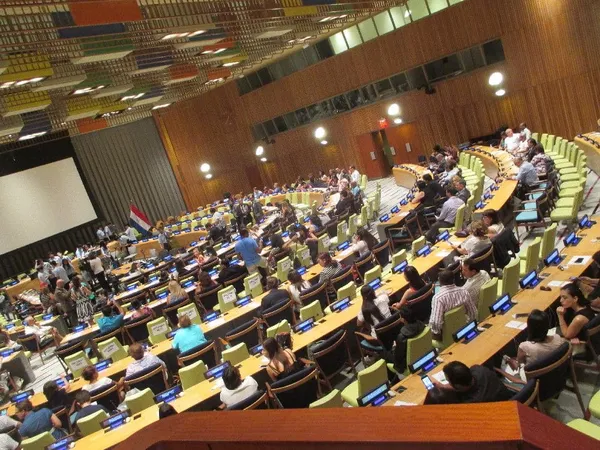 |
| The Recycled Orchestra of Cateura at the United Nations Photo: Anne-Katrin Titze |
In Robert Altman's The Player, Tim Robbins (as Griffin Mill) walks on the street at night, in Pasadena, past Megadeth posters pasted on the wall signalling a significant event to come in the film. In Brad Allgood and Graham Townsley's Landfill Harmonic, co-directed by Juliana Peñaranda-Loftus and co-produced with Alejandra Amarilla, we see the flag of Paraguay painted with the name Megadeth by members of the Recycled Orchestra of Cateura doing the trick to bring David Ellefson, Dave Mustaine, Shawn Drover, and Chris Broderick to perform with them Symphony Of Destruction.
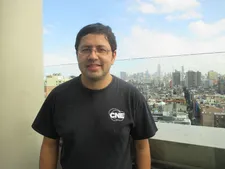 |
| Favio Chávez: "There are events that happen that build a story." Photo: Anne-Katrin Titze |
Cary Grant in Alfred Hitchcock's North By Northwest, Nicole Kidman in Sydney Pollack's The Interpreter, and Audrey Hepburn in Stanley Donen's Charade as a UN interpreter came to mind as I entered the always spectacular, Oscar Niemeyer designed headquarters of the United Nations.
Favio Chávez, the orchestra's leader and founder, conducted a performance there last night presented by the Permanent Mission of Paraguay to the United Nations and the General Consulate of Paraguay in New York.
In my conversation with Favio we discuss why he came to Cateura landfill outside Asunción in the first place, meeting Colá Gomez, the Recycled Orchestra's instrument maker, and how "both recycling and music are two sides of the same thing".
Anne-Katrin Titze: There are a number of wonderful lines by you in the film. One of them is that culture is a basic human need. Is that belief at the core of what you are doing?
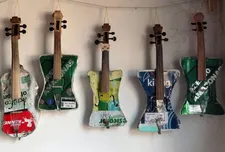 |
| Instruments of the Recycled Orchestra of Cateura built by Colá Gomez |
Favio Chávez: It's one of the main ideas that we wanted to convey. Because the place where I work is a place where the kids have not met their most basic needs. Even in those conditions, for them the music is something important.
AKT: Tania in the film says "without music, my life would be meaningless."
FC: Because music brings a sense of meaning to her life.
AKT: You first went to the area around the landfill as an environmental technician. It is mentioned that the recycling program failed. What happened? Why did it fail? What failed?
FC: Because the solutions sometimes are not only technical solutions. When there are problems that involve people, it is not enough just to make a rule. It's not enough to apply a formula. There is the need of meeting those people to know how they feel, open their mind, and then you will be able to build them an alternative, a solution.
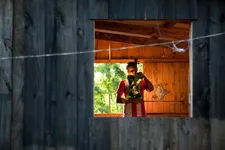 |
| Tania Hertz in Landfill Harmonic: "Without music, my life would be meaningless." |
AKT: How did you meet Colá [Gomez]?
FC: Colá used to work in the landfill. And I was the technician that went to the landfill to work. We met in that place that is so uncommon. It's a very uncommon place to make friends.
AKT: If that meeting hadn't happened, there would be no film, no orchestra! If you hadn't caught each others eye at the landfill, I wouldn't be sitting with you on a roof in downtown Manhattan.
FC: There are events that happen that build a story. The same way there are things that don't take place that could destroy a story. There are many kids that don't have the opportunity that the kids from the orchestra have now. Maybe their story won't be built.
AKT: There is a great moment when you make a comparison to a train. Even when you're not ready, you have to get on that train. It might only come by once. That's good advice.
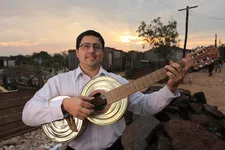 |
| Favio Chávez: "Each person will decide if they want to get on the train or not." |
FC: What we do is to allow that the train goes around. Each person will decide if they want to get on the train or not.
AKT: You also say "To have nothing is not an excuse for doing nothing." I particularly like the circumstances when you say that - in front of an audience filled with people who have quite a bit more than the people in the film. Did you say this for them?
FC: Yes, but I also use it a lot in Cateura. When a person doesn't want to do something the first excuse is, I don't have anything to do. For example when a teacher comes for the first time to Cateura and we, as an orchestra, paid the teacher to go and teach there - the teacher is saying: "Oh, I don't have this, I don't have that. I don't have the conditions to teach! " So I tell him, do not pay attention to what you're missing. Work with what you have! Pay attention to what you have! That doesn't mean that you can't do something about it.
AKT: The objects the instruments are made from are really fascinating. Ada [Ríos] was showing me the baking tin, the fork. At a point in the film we see a broken-off heel - pink, lady's size12. Were there objects that surprised even you that instruments can be made from?
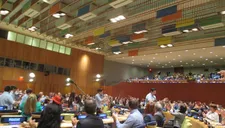 |
| Favio Chávez leads the Recycled Orchestra with Ada Ríos into the audience Photo: Anne-Katrin Titze |
FC: The secret is to start looking at garbage in another way. It's to give things a second opportunity. So a shoe heel can be used for the tuning of a cello. A fork that has four prongs - I could use that as the base for the violin strings. And from there you just have to let your imagination fly. If we see things in a different way, garbage in a different way, we would throw away less things. We would have less garbage to begin with, less contamination, less consumerism. That's the message we want to share with the instruments.
AKT: Megadeth almost seems like a found object. Because of Ada's love and her father's love for them. Did you have any specific affinity for Megadeth before?
FC: No. I never listened to rock. I had never been to a rock concert before.
AKT: So this was one of those "trains" to get on for you?
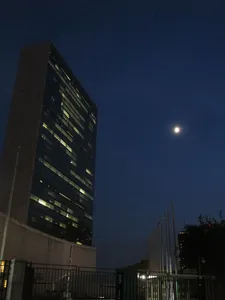 |
| Moon over the Oscar Niemeyer designed United Nations Photo: Anne-Katrin Titze |
FC: Yes!
AKT: The school is still going strong? Are the older ones teaching the little ones?
FC: The train, that we were talking about, means that the one who was a passenger could go to be the driver. They continue to drive the train so that more kids can get on.
AKT: A last quote from you - "Just to be on the stage is a victory". You say that after the Ode to Joy performance. The progress the orchestra makes over the course of filming is startling.
FC: The fact that they moved from a place where they were totally anonymous and to be in front of an audience, that's the first achievement.
AKT: And you, Juliana, were you surprised?
Juliana Peñaranda-Loftus: To be honest, I believe in people and I try to see the potential. I knew I was going to risk the next years of my life on somebody, so I better know where I put my time. And I saw the potential in him and that he could do that. We had interviews with the kids and the parents. I think it was fate.
I come from a very small city myself and to be doing what I'm doing right now, I know people can do it. More than surprised, I'm just happy because I knew they had the interior force to make it. I always told Favio: "When we come to the United States together… " In 2010, I told him we're going to go to the United States and we're going to have a tour.
AKT: And here you are. Did you, Favio, ever go back to your recycling career in any other capacity or is it through music now?
FC: Both recycling and music are two sides of the same thing [he touches a page of my notebook]. The difference is impossible to separate. They are two different things but for me it's impossible to take them apart because together they bring the message.
Read what Juliana Peñaranda-Loftus and Alejandra Amarilla had to say about the evolution of Landfill Harmonic.
Coming up - Members of the Recycled Orchestra on the film Landfill Harmonic, Megadeth, and more.
Landfill Harmonic opens today, September 9 in the US.
On Saturday, September 10, after the 3:00pm screening of Landfill Harmonic at Cinema Village in New York, Anne-Katrin Titze will moderate a Q&A with the Recycled Orchestra, followed by a musical performance.





















